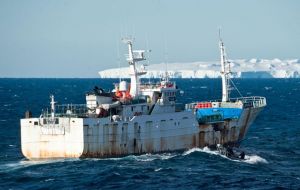MercoPress. South Atlantic News Agency
Toothfish poachers caught red-handed in Antarctica waters slip away
 “It's the start of a lengthy process to try to stamp out such insidious activity,” said Murray McCully, New Zealand's foreign minister.
“It's the start of a lengthy process to try to stamp out such insidious activity,” said Murray McCully, New Zealand's foreign minister.  The New Zealand navy took photos and video of the fishermen hauling in prized fish in banned nets from the ocean near Antarctica
The New Zealand navy took photos and video of the fishermen hauling in prized fish in banned nets from the ocean near Antarctica Staying hidden behind sea ice and large waves, sailors aboard a navy patrol boat from New Zealand sneaked up on three suspected poaching ships, then took photos and video of the fishermen hauling in prized fish in banned nets from the ocean near Antarctica. Seemingly caught red-handed, the crews of the rusting vessels just kept on fishing.
Authorities say this month's high-seas confrontations, and the detailed evidence collected, mark a first in Antarctic waters, where regulators have long suspected poaching activities but have found them difficult to police in an area that's roughly the size of the continental United States.
It is a huge illegal business: Each of the ships could hold more than $1 million worth of Antarctic toothfish, marketed in North America as Chilean sea bass.
The three ships were encountered between Jan. 6 and 13, near Commonwealth Bay and about 110 kilometers from the Antarctic coast. Each quickly hoisted a flag proclaiming it to be a fishing vessel from Equatorial Guinea, said Lt. Cmdr. Graham MacLean, the patrol boat's commanding officer. When the navy demanded to board to check documentation, each of the three captains flatly refused, he said.
MacLean said he decided the 16-foot swells made it too dangerous to board the ships using force, so the fishermen slipped away, carrying with them hundreds of Antarctic toothfish. The fish can grow to over 6½ feet in length, weigh up to 265 pounds and sell for thousands of dollars apiece.
New Zealand hopes the confrontations will mark a turning point in the pursuit of poachers. It has sent an alert to 190 countries through Interpol, a move it hopes will make it difficult for the three crews to unload their catches. And it's trying to exert diplomatic pressure on nations it suspects could be harboring poachers.
“It's the start of a lengthy process to try to stamp out such insidious activity,” said Murray McCully, New Zealand's foreign minister.
Records show the three ships — the Kunlun, the Songhua and the Yongding — have repeatedly changed their names, country of registration, and ownership details in an apparent attempt to stay one step ahead of the law.
According to the Interpol summary, the three ships are ostensibly owned by shell companies in Central America, under listings that reveal nothing about the “true beneficial owners” of the vessels.
The Kunlun has been called the Black Moon, the Galaxy and the Dorita, among other names, and has been registered in North Korea, Sierra Leone, Tanzania, Panama, Indonesia and Equatorial Guinea. Despite the fishermen's use of Equatorial Guinean flags this month, McCully said the central African nation's foreign minister has told him the ships are not currently registered there.
The dozens of crew aboard the three ships point to the scale of the operation. Each ship ranges in length from 157 to 203 feet with the heaviest, the Songhua, weighing more than 1,100 tons.
Back in 2008, when the Songhua was named the Paloma V, an investigation linked that ship to a Spanish company, Vidal Armadores. In 2010, the company was fined $200,000 for participating in illegal fishing activities with the Paloma V near Antarctica.
McCully said he believes the Spanish company is currently involved with the three ships: “Everything we have seen points to Vidal Armadores continuing to control and manage this illegal activity.”
Spain's Ministry of Agriculture, Food and Environment said in a statement it has requested more information from New Zealand and will initiate proceedings under national and European legislation if any Spanish citizens are found to be involved.
With highly valued toothfish in remote locations, the Southern Ocean around the Antarctic is believed to be a hotbed of illegal fishing. Poaching of the Antarctic toothfish is making it difficult for scientists to understand the impact fishing is having on the species, said Andrea Kavanagh, director of Antarctic and Southern Ocean conservation for The Pew Charitable Trusts. (FIS).-




Top Comments
Disclaimer & comment rules-

-

-

Read all commentspoachers caught red-handed in Antarctica waters slip away
Jan 22nd, 2015 - 08:06 pm 0Butter Fingers...lol
The simple problem is that they did not encounter a more aggressive navy. The Russians, Americans, French, Chileans, etc... would have had them at the bottom of the South Pacific after the second warning shot.
Jan 22nd, 2015 - 10:35 pm 0In the case of Chile, there has been three cases alone during my service.
I get all nostalgic for when Britain truly 'ruled the waves' and the Royal Navy conducted operations in every corner of the World. Or even before then, when the English 'privateers' robbed the Spanish Main and brought back the loot to fund the Industry at home...
Jan 23rd, 2015 - 03:01 am 0Those that sought to help liberate people from the Spanish yoke...
;-)
Sir Francis Drake, Lord Nelson, Lord Cochrane (the 'Sea Wolf') etc.
Legends, one and all!
However, from this article we can see the legacy. The proud member of the British Commonwealth are still there, doing their best in difficult circumstances.
Good Luck to them All!
Commenting for this story is now closed.
If you have a Facebook account, become a fan and comment on our Facebook Page!